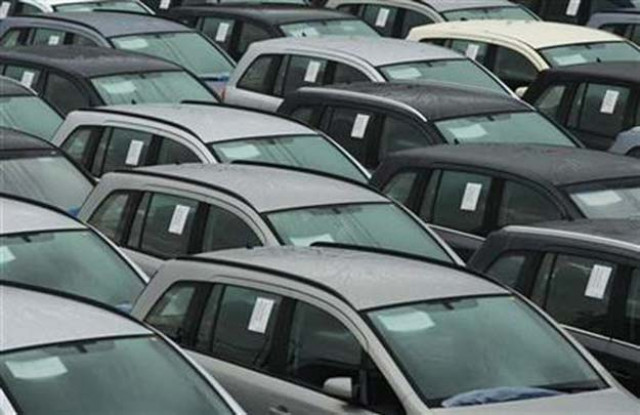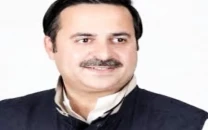Approval of car import rules put off
Stakeholders say new measures are too harsh, will stop all vehicle imports

The government on Friday approved the restoration of international trade in gold but deferred the approval of highly stringent measures aimed at stopping the misuse of special schemes for friends and relatives to send private vehicles from abroad.
The Economic Coordination Committee (ECC) deferred the approval of a summary of the Ministry of Commerce, seeking amendments to the procedures for the import of vehicles under the personal baggage, transfer of residence and gift schemes.
The ECC did not approve the summary due to differences among stakeholders, who were of the opinion that the new measures were too harsh and would eventually stop all imports.
According to an official announcement, after detailed deliberations on various aspects of the proposal to amend the procedures, the ECC directed the Commerce Division to undertake further consultations with relevant stakeholders and resubmit the proposal.
The commerce ministry had recommended that the import of vehicles should only be allowed from the country where the sender resides. However, the Federal Board of Revenue (FBR) was of the view that it would make import impossible as a majority of the people live in countries having left-hand-drive cars.
The Ministry of Industries wanted to completely abolish the gift scheme and the baggage scheme while only retaining the transfer of residence scheme. However, the commerce ministry wanted to retain all the three schemes, but proposed measures to stop their misuse.
Until recently, the commercial import of cars was illegal and the people misused these schemes to get better quality imported cars at competitive rates.
The commerce ministry proposed that the intervening period for the import of vehicles should be increased from two years to three years and the vehicles imported under the three schemes shall remain non-transferable for one year.
According to one of the most stringent measures, to qualify for the scheme, the minimum stay abroad should be increased to three years, with cumulative stay from 180 days to 850 days for all the three schemes. Moreover, the vehicle has to be registered abroad in the name of the sender before import to stop the misuse of his passport by a third person.
There was also a view to completely abolish the gift scheme, which was first expressed by the prime minister about three months ago. However, due to divergent views, ECC Chairman and Finance Minister Muhammad Aurangzeb asked the ministry to have another round of discussions with all stakeholders.
The ECC reviewed a proposal from the Ministry of Commerce on improving the pre-shipment inspection (PSI) framework under the Import Policy Order 2022. The committee approved measures to allow accredited and registered PSI agencies to conduct inspections in line with the policy.
The ECC reviewed a proposal from the Ministry of Commerce on the import and export policy for precious metals and jewellery. It approved the continuation of the existing framework with enhanced transparency and automation measures to improve efficiency and traceability.
With the decision, the entrustment and consignment policies, aimed at exporting jewellery either by first import or local purchase, have been restored, subject to the ratification of the decision by the cabinet.
The Statutory Regulatory Order (SRO), which governed the regulatory framework for the gems and jewellery trade, had expired on July 8, 2025. Earlier, in May, the federal cabinet had suspended the SRO and constituted a committee to review it, identify loopholes and recommend improvements within 60 days. The ECC was told that there was no misuse of these schemes and these facilities should be restored to allow the international trade in gold.
The commerce ministry had also submitted a formal note to the prime minister, recommending the reinstatement of SRO 760, noting that no discrepancies had been reported in trade data under the earlier regime.
The ECC approved a supplementary grant of Rs2.5 billion for the establishment of the Pakistan Maritime Science and Technology Park under the Pakistan Navy and approved another grant equivalent to AED 45 million available in rupee cover with the Frontier Works Organisation (FWO) to settle an overdraft facility utilised by the FWO for its overseas construction operations in the United Arab Emirates.
The Election Commission of Pakistan (ECP) approached the ECC for a supplementary grant amounting to Rs456 million to meet expenditures related to the conduct of local government elections, which the committee approved.
The ECC approved a summary from the Ministry of Interior & Narcotics Control seeking a grant of Rs21.5 million for the procurement of spare parts for helicopter maintenance by the headquarters of Pakistan Rangers (Punjab) during the current fiscal year.
The ECC reviewed the rising prices in the country and emphasised the importance of sustained monitoring, enhanced coordination among relevant agencies and timely interventions to safeguard the purchasing power of the public and ensure overall price stability.
During the meeting, Dr Imtiaz Ahmad, Chief Economist, Ministry of Planning, Development and Special Initiatives, made a detailed presentation on inflation trends and price movements, including the findings and recommendations of the National Price Monitoring Committee (NPMC).























COMMENTS (1)
Comments are moderated and generally will be posted if they are on-topic and not abusive.
For more information, please see our Comments FAQ